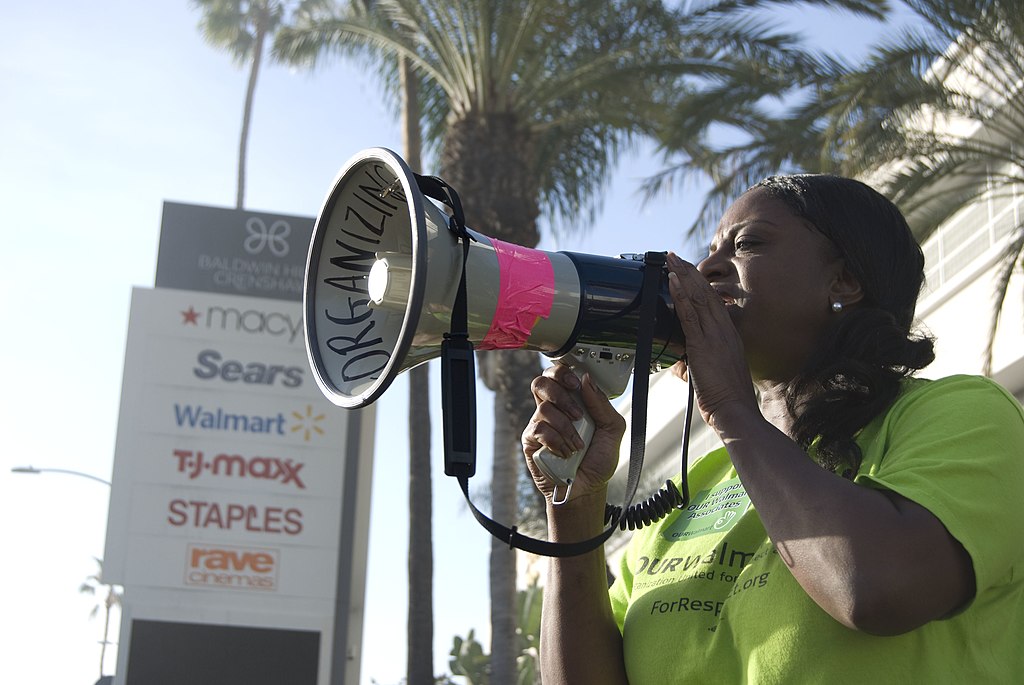
I only attended one meeting of my college’s Black Student Union. It was a spirited gathering, filled with energy and familiarity. In the large classroom where the few dozen students met, I could feel the ease that comes with stepping off stage, out of the spotlight of hypervisibility shined by an elite, predominantly White institution. At that point, around the turn of the millennium, a Black Student Union functioned as essentially a social club, affirming Black identity by creating Black spaces on campus. I was looking for something else, so I did not return.
I found my people in political organizing work. Classmates and I built friendships with the predominantly Black, poorly paid janitors, dining hall workers, and maintenance crews. We heard the challenges they and their families were facing just to get by. We imagined, with them, what a university community might look like that valued each of its members, whether they were students, alumni, faculty, or staff. And we strategized together, formulated demands, targeted administrators, and generated media attention. We reached out to alumni who had been involved in a previous generation of campus activism, demanding divestment from apartheid South Africa, and we staged dialogues with them about the connections between our struggles.
In short, I found fulfillment and joy in struggle. It was struggle largely, but not exclusively, with Black folks, and it was struggle against the powers that asserted their arbitrary rule over my community members and friends. It was struggle that grew out of a tradition of contesting domination, a tradition that cultivated the agility needed to locate domination in new forms, whether it was university investments in apartheid South Africa, sweatshops manufacturing university-branded merchandise, labor conditions on campus, or—in the campaign to which we would turn after the success of our labor organizing—divestment from Israel.
This contrast between Blackness as a social fact, defined in relation to the blinding light of Whiteness, and a tradition of Black struggle is at the heart of my project in Black Dignity. I argue that much goes wrong when it seems sufficient to wallow in shared identity. Shifting away from that framework, toward a tradition of struggle requires fundamentally rethinking moral categories (including love, hope, excellence, and dignity) and political strategies (abandoning the false security offered by respectability). Unlike when I came of age, in the heyday of multiculturalism, Black justice movements rooted in traditions of struggle have much more visibility today, and Black Dignity seeks to make their intellectual and political shape explicit. The book also develops resources to help us remain vigilant against the tendencies within these movements and the pressures from reactionary forces without that flatten Blackness into an essentially apolitical social club (even if that club mouths radical slogans).
I am grateful to the participants in this symposium—each a scholar whose work I greatly admire—for probing, extending, and questioning my project in Black Dignity. While they raise many important issues, I will briefly respond to the pressure they put on the concept of tradition that is at the heart of my book.
Unlike when I came of age, in the heyday of multiculturalism, Black justice movements rooted in traditions of struggle have much more visibility today, and Black Dignity seeks to make their intellectual and political shape explicit.
While the “Black radical tradition” has become a fashionable phrase in leftist political circles, secular activists and intellectuals rarely take the concept of tradition as seriously as scholars of religion take it. From a secular perspective, a tradition is often a historical curiosity, a resource to draw on, or a chain of influence. Scholars of religion ranging from Alasdair MacIntyre to Jeffrey Stout to Saba Mahmood, in contrast, understand tradition as setting a horizon of possibility and as shaping reason, feeling, and imagination. Most importantly, scholars of religion attend to the normative force of tradition: participants in a tradition ought to act in accordance with a tradition, even if what that means is always contested.
Black Dignity argues that Black justice movements constitute a tradition in a rich, deep sense, shaping and obligating their participants. But this tradition has some peculiar features: it is unified not by empirical facts about people or histories but by a shared commitment to struggle against the paradigm of domination (slavery and its afterlives). The horizon of possibility set by this tradition involves rejecting horizons of possibility, imagining the impossible. With the world infected by domination, that is the only way of orienting ourselves to a world free of domination.
With reference to Palestine/Israel, Shaul Magid worries that a tradition once focused on struggling against domination can transform into an ideology of mastery. This strikes me as a hugely important point across contexts and scales, including when Black elites embrace the language of justice struggles. Turning a tradition inside out in this way requires, first, secularizing it, tethering it to a specific set of worldly, empirical people, events, and demands. But the grandeur of tradition, and particularly the Black tradition I describe in my book, is a product of its ontological rather than merely ontic nature: it is about more than the eye can see, about more fundamental questions than those we encounter in everyday life. Maintaining this position requires humility and a tragic sensibility, but it is an essential prophylactic against cooptation by politicians, CEOs, cable news commentators, and, yes, professors.
Rosetta Ross’s reflections implicitly raise the question of orthodoxy within the Black tradition. If the tradition is pragmatic, proceeding via bricolage to address the problems of the day, how can we tell what counts and what doesn’t count as part of the tradition? If scholars of religion can restore vitality to the dusty-sounding category of tradition, might they also save the category of orthodoxy from being identified with dogmatism? To acknowledge the normativity of the Black tradition requires some sense of orthodoxy, but the process of discerning that orthodoxy strikes me as, again, requiring a light touch and an awareness of our fallibility.
The grandeur of tradition, and particularly the Black tradition I describe in my book, is a product of its ontological rather than merely ontic nature: it is about more than the eye can see, about more fundamental questions than those we encounter in everyday life.
To what extent is the Black tradition—in this book I center the African American tradition— commensurable with other traditions? Siphiwe Dube productively explores the ways in which Black African traditions can be read as part of the Black tradition I describe, but could this equally be the case with, say, Adivasi traditions in India, Aboriginal traditions in Australia, and Indigenous traditions in South America? Was it the case for the colonial American tradition, struggling against the domination of the British crown? Ukrainians fighting today? In Black Dignity, I leave these questions open, but I do point to procedures for addressing them. In short, we must move back and forth between paradigm cases of domination and the complexities of actual domination in the world. Blackness occupies a privileged position because the Atlantic slave trade is as close as we get to a paradigm case of domination, providing an example of mastery in laboratory conditions, as it were, with the enslaved stripped of land, language, family, and culture so as to be entirely subject to the arbitrary rule of their masters.
Closely related to the question of commensurability is the question of traditions that nest, one inside the other. Nadia Fadil points out that, in the Belgian context, the shape, perception, and politics of Afrodiasporic communities is quite different from those of Muslim communities. Belgian culture uses various techniques to manage (or destroy) the communities within it – making it impossible to talk about fully autonomous Afrodiasporic or Muslim communities within Belgium. Fadil describes this process as disciplining wills within Muslim communities, and she suggests that cultivating respectability and solidarity may be necessary for survival amidst these pressures. I agree that the European cases Fadil describes are at quite a distance from the paradigm case of domination, in the Middle Passage, but so are the North American cases. I worry that the urgency of political rhetoric about anti-Blackness in North American at times obscures that distance, and the complexities of culture and context that follow from it. In Black Dignity I urge that we toggle between that distant paradigm case and the urgent, complex problems of the present, in a process that acknowledges the need to be strategic about struggle, generates solidarity, and appreciates that dignity, understood as struggle against domination, is wildly contagious.
Finally, Traci West asks when the story of a tradition needs to be reworked to exclude someone whose contributions we discover to be severely compromised—in a sense, this is the question of excommunication. The issues around misogyny she raises are urgent, not only in the well-known case of Cleaver but also in the case that I discuss in the book and elsewhere of CLR James (who confessed to rape in his unpublished autobiography) and Martin Luther King, Jr. (whose notorious misogyny cannot be relegated to a footnote). Once again, I do not think there are easy answers about what to do with such figures. In Black Dignity I suggest there are instances where excommunication is appropriate, even if making such decisions are risky. Once again, it strikes me as essential to tread lightly, aware of the likelihood of error in our discernment.
We live in exciting times: the Black radical tradition is increasingly visible in our public conversations about racial justice, and it is guiding how young people are growing into their Blackness. We also live in precarious times, when overt and subtle attacks on Black justice movements threaten to silence or deform those movements. Maintaining a rich sense of the tradition part of the Black radical tradition—through debating its meaning—promises to gird resurgent justice movements against their detractors.

